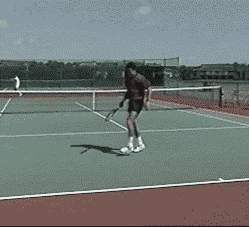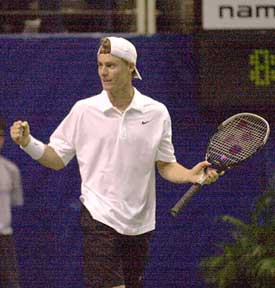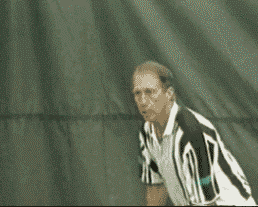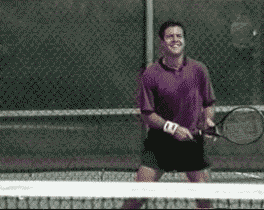The <% ns_puts [mkm_getnavbar] %>
From Negative to Positive
|
|
Is your time on the tennis court punctuated with negative thoughts and
self-criticism? Are you frequently disappointed, even bitterly
dissatisfied with your tennis, so that you leave the court questioning
your ability to play the game?
How does this kind of self-abuse affect your ability to achieve the ideal
performance state in tennis? Frequently, we see successful competitive
tennis players abuse themselves unmercifully during their matches.
“You're the worst tennis player on the planet. You should just quit this
game right now, etc, etc..” Hang around at junior tennis events and you’ll
see this kind of extreme negativity is all too common.
Yes, some successful players are negative. But the fact is, high
negative energy rarely, if ever, brings out a player's real potential or
best performance.
It doesn't lead to the biochemistry of the
ideal performance state or a
sense of fun on the court. If you win, it feels good at the end of the
match just to be out from under all that strain.
But if you lose, the negativity can stay with you for hours or even days.
In extreme cases, the result can lead to burnout. High negative energy
will eventually teach you to hate the game.
|
|
In less extreme cases, negative thinking simply blocks your development
as a player and your ability to enjoy the game and play your best.
A teaching pro I once knew was frustrated working with a promising junior.
Hitting backhands, the player would produce beautiful strokes until she
missed two or three balls in a row, at which time the stroke would
completely disintegrate.
After extensive technical work failed to eliminate the problem, the pro
asked her to go inside her mind and observe her internal mental dialogue
after she missed the next backhand. "What exactly do you say to yourself
after you miss?" he asked her.
To his surprise, the answer came back, “I suck!” It was internal
negative self-talk that was the interfering problem, not the stroke
itself.
As long as the student was unconsciously berating herself after every
error, she was unable to focus on the next shot and proceeded to miss more
and more backhands.
Many players, at all levels, are dealing with this kind of negativity
without even being aware how it's affecting their play.
The solution is to replace these negative internal messages with positive
ones, to learn to think and to talk to yourself in a way that will lead to
better performances and ultimately to the ability to achieve your ideal performance state.
|
|
How can this be accomplished? The first step is simple awareness. Like
the student struggling with her backhand, many players are simply not
aware of how they are talking to themselves or the affect it may have
on their ability to perform.
Start to listen to your internal dialogue. Ask the question: What exactly
am I saying to myself in various situations, particularly when I am not
playing my best?
Make a list of all the negative on-court responses you discover. “I suck.”
“I can't hit a backhand.” “I never beat this player.” “I choke every easy
shot.” Whatever your own particular negative emotional responses may be,
notice exactly when and how they come up on the court.
Now, for every negative response, formulate a specific positive counter response. “I can hit this shot.” “Keep trying.” “I'll find a way to beat this guy.” “I want the opportunity to hit shots under pressure.”
Then start to use the counter messages on the court. When you miss a backhand, for example, consciously tell yourself that the miss is no problem and that you'll make the next one. “Give me another one.”
Click image to view |
When the self-criticisms come up, notice them and then let them go and then immediately counter the negative thought with a positive affirmation.
If you find that the negative thoughts continue, simply say, stop. Then replace the negative message with a positive one instead.
You may raise the objection: “That won't help! I really don't think I
can hit that backhand, and telling myself I can isn't going to change
that.”
As powerful as the negativity seems, it wasn't something you were born
with. You learned it. And you can learn to be positive instead, if you're
willing to make the effort.
It may sound simple, but it's true. The way to change is to simply repeat
the positive attitudes you want to acquire over and over and over.
|
|
This is called repetitious thinking. Using it, you can literally reprogram
yourself to think positively, in a new way, for the future.
Probably, the ultimate test of a player's ability to deal with negative
thinking is when there are disputes over calls.
Bad calls tend to come at the most critical junctures in matches. They can
be the real turning points in deciding who wins or loses.
However, it is rarely the call itself that determines the match. Rather,
it is usually the player’s emotional reaction to the call that affects
the outcome.
Does this scenario sound familiar? On the first close call, you let it go,
but give your opponent a look. It happens again, so you challenge him
about the call.
Reversing himself when he is under attack would be admitting guilt. Next
thing, he starts to call every close ball out, and you've got a war on
your hands.
Is there another way to handle bad calls in a way that allows you to keep playing your best and maximize your chances of winning the match?
|
|
Even if your opponent has a reputation for making bad calls, never challenge his integrity by accusing him of cheating, either directly or indirectly.
If you receive what appears to be an obvious bad call, ask for a
clarification, but be careful to do this in a non-threatening tone.
An example would be: “Was that ball in or out?” Give your opponent the
chance to revise his call to save face.
If you continue to disagree with a series of calls, ask for the linesman
by telling your opponent that you would like “to get some help with the
line calling.”
Rather than fuming over your opponent’s behavior, the best response to
this situation is to dig in and get challenged. Become one of those
players who plays better and gets even more determined when he thinks his
opponent is cheating him.
Dealing with tough situations like disputes over calls in a positive way is part of developing a love of the game and the competitive struggle that will last for a lifetime.
|
Want to learn more about mental toughness from Jim Loehr? Check out his other original articles in the TennisONE Lesson Library. |
Your comments are welcome. Let us know what you think about this article by emailing us here at TennisONE.
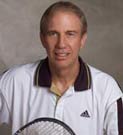 Dr.
James Loehr, CEO of LGE Performance Systems, is recognized as a world
pioneer in the field of sports psychology and mental toughness training.
Dr.
James Loehr, CEO of LGE Performance Systems, is recognized as a world
pioneer in the field of sports psychology and mental toughness training.
He has worked with dozens of elite athletes in Olympic and professional sports, including Grand Slam champions such as Martina Navritilova and Jim Courier.
For more information about training packages for tennis or for the corporate athlete, click here: http://www.corporateathlete.com/index.html
 Pro
Secrets of Mental Toughness
Pro
Secrets of Mental Toughness
In Pro Secrets of Mental Toughness, Jim Loehr, the world’s leading sports psychologist, trains you to develop the same mental skills used by the world’s top professional players.
Overcome choking, play your best tennis under pressure, become the player you really want to be!
Click here for more info
To contact us, please email to: webmaster@tennisone.com
TennisONE is a registered trademark of TennisONE and SportsWeb ONE; Copyright 1995. All rights reserved.


